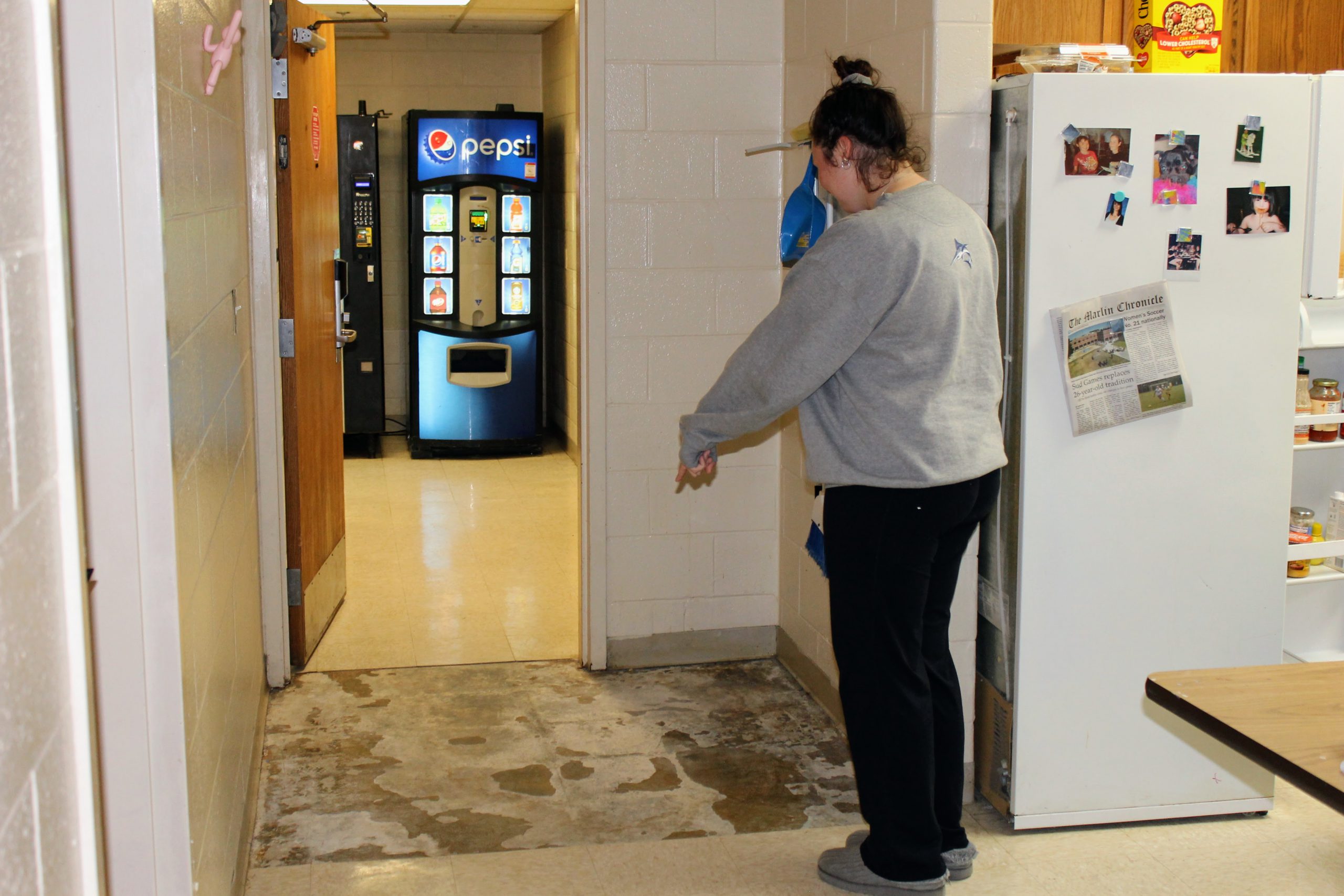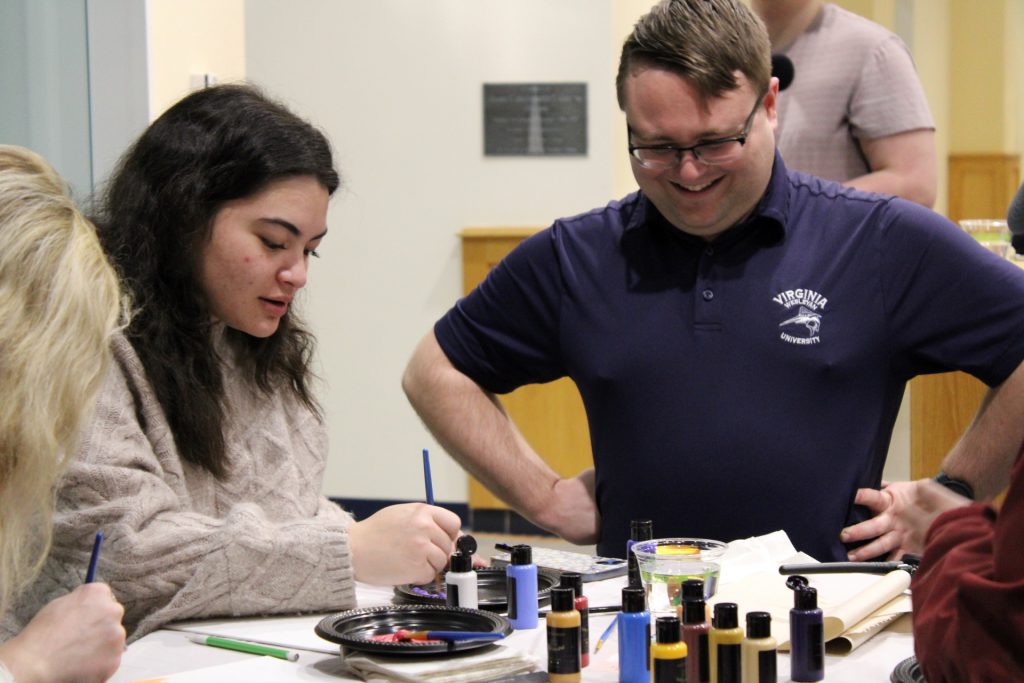VWU residents expect improvements after vocalizing complaints, Director of Residence Life David Stuebing responds to comments from students.
Mold, leaking and water damage are frequent problems for Virginia Wesleyan University, but the severity and scope of student concerns geared toward Residence Life has only broadened through the years.
Students are open about their experiences with mass housing at VWU.
Jaime Corley, a freshman International Studies student said, “Our room has mold in the air vents. We put in a work order because I was sick, and now my roommate is sick. Someone from maintenance came to check and said that there was just dust in the vents and someone would get it cleaned right away.”
This was over a month ago and while both roommates’ sicknesses linger, Corley insists that there is mold in the vents. “We both still wake up in the middle of the night coughing,” Corley said. She and her roommate reside in Old Hall in Bray Village.
Corley stressed the lack of mold management in her room, extending her complaints to their resident assistant (RA). “We told our RA, and she said she would reach out to Res Life about it but that was also two weeks ago,” Corley said.
According to students, mold has been a consistent problem in residence halls. Breathing in mold can cause severe respiratory irritation and may require medical attention to combat effects.
Junior Britni Arrington, who majors in Art and Psychology, attests to this. “So many people are allergic to mold,” Arrington said, “Why pay so much money to live somewhere that’s going to constantly make you sick?”
Corley commented on the ability of Residence Life to manage requests of students.
“You’ll put a work order in and it’ll get ignored or when it finally does get addressed, nothing is handled, nothing is taken care of,” Corley said.
Corley attributes part of the problems to a lack of relationship between students and Res Life. “I don’t think it’s intentional but I think they’re aware that it happens and they just roll with it. I wouldn’t say they sought out to do that in the first place but I think they’re going to continue to do it because it’s easier.” Ultimately, Corley said “[Housing on campus] isn’t worth the money, 100% isn’t worth it.”
Freshman Kyla Robberecht, another resident of Old Hall, said if she could change anything about her on-campus living experience, it would be to have “cleaner showers… or cleaner everything.” Old Hall has communal style bathrooms with housekeepers that aid in cleanliness.
“I literally walked out of my room one day and I stepped in a puddle of something. I was so grossed out,” Robberecht said.
Corley agreed with Robberecht’s statement of cleaner living conditions. “Our bathroom has mold between the grout and tiles, there is mold in the sinks and mold on the shower curtains and on the back of the toilets. Maintenance comes and sprays it down like once every couple days,” Corley said.
While it is true that some sanitation concerns can be attributed to the mass housing of young adults new to living on their own, others stem from issues far beyond a student’s control.

The Office of Residence Life has sent mass emails that remind students of ways they can be proactive in improving their own experiences. On Aug. 30, a week after classes started, Residence Life sent out an email that included guidance for maintaining low humidity levels such as keeping the windows closed and air conditioning running.
“It’s expected that everyone is doing their part to keep our spaces clean – we’ll do our part and you do yours!” the email said.
Problems and solutions typically are known by David Stuebing, the director of Residence Life on campus.
Stuebing stresses the importance of students taking responsibility for their own housing conditions as well. “There are a million things for students to learn about living independently – from what they can do preventively to keep their space nice, to changing habits now that there isn’t someone cleaning up after them, and even how to respond to a challenge appropriately,” Stuebing said.
Junior Doots Glodek, a Recreational Therapy major who transferred to VWU this year, had a list of concerns about the conditions of her Gum Hall residence in Allen Village.
Glodek said, “Our washer and dryer keep having problems, they closed the bathroom and one of the shower stalls last minute with little notice to do work that fixed nothing, we had no water for hours last week, no hot water the other day, one of our doors to the building was broken and you didn’t need a keycard to get in … Need I go on?”
Timeliness around maintenance completing work orders has also been a major concern for residents.
Chloe Dewberry, a senior and Business major living in North Hall in Brock Village, said that in response to her ceiling leaking over her bed, she submitted two work orders. “The first one, they just accepted, but they didn’t do anything,” she said.
Dewberry submitted the second work order as Hurricane Ian was approaching. “After the hurricane left, they decided to come fix my ceiling,” she said. In total, Dewberry said it took 10 days for her ceiling to be fixed.
To deal with the situation in the meantime, Dewberry said, “I moved my bed away from the wall, so when it dripped, it just dripped into a trash can that was on the floor.”
Sophomore Mae Bryant is a History major living in Johnston Hall. Bryant has dealt with a hole in the ceiling since the start of the school year.
“I had my RA fill out a work order for it, but it was dismissed. I filed a second work order and it was patched with the promise that it would be sanded and painted,” Bryant said.
A month later, Bryant said she pointed out the issue again when Director Of Residence Life David Stuebing came with other staff members into Johnston Hall.
Bryant said, “The previously applied plaster had started gaping and falling off and they had promised it would be fixed within the next week.” She said an email informed her of a surge of work orders filed that week that would further delay the hole from being fixed.
“Two weeks ago the ceiling was repatched with plaster and I was assured that it would be sanded and painted the next day. They have not returned and my ceiling remains plastered and unpainted.” This statement was made on Nov. 10.
Freshman Phillip Proctor said that it took two weeks for maintenance to see to the air conditioning unit leaking onto the floor in his Eggleston Hall room. After that, he said an installation issue caused his room to have no air for two more weeks.
According to Proctor, this issue led to more problems. “A month ago they had to re-tile the floor and they took up four tiles and broke two and still have not re-tiled, leaving us with uprooted tiles,” he said.
Regarding complaints toward work order delays, Stuebing said, “Res Life does not directly oversee work orders but works closely with our Facilities staff to follow up on issues since we share the goal of providing quality living spaces for our students. When a work order is submitted, Facilities staff must prioritize their response.”

Ross Winner|Marlin Chronicle
Stuebing pointed out that the system Facilities Management uses for work orders can get backlogged. He used Hurricane Ian as an example of a circumstance that led to one of such backlogs. In those times, Stuebing said “work orders that are not emergencies may have to wait until more urgent issues can be addressed.”
Proctor’s uprooted tiles were not the only case of missing floors around campus. Sophomore Regan Miller said the problems in her Teagle Hall suite in Brock Village have ranged from water to bugs to mold. Most noticeably, part of the floor has been gone for over a month.
Miller said that following Hurricane Ian, puddles of water drenched their floor “due to a leakage coming from some sort of pipe.” This eventually resulted in maintenance coming to uproot a large portion of their tile floor.
However, Miller said they didn’t hear back from maintenance about the installation of a new floor until last week, when they learned that it wouldn’t be resolved until Thanksgiving.
Junior Savannah Galbraith, a student in the Undergraduate Education Program, lives in the same Teagle Hall suite. Galbraith said, “When [the floor] was originally looked at by maintenance, we were told it would be resolved as soon as possible.”
Galbraith pointed out that a major concern is how the appearance of cleanliness in the suite has declined at this major cosmetic deficiency. “It makes the place look gross with the floor torn up only in some areas,” Galbraith said.
Stuebing attributes some of the mold and water damage to the environment surrounding the campus. “Living on a forested campus near wetlands, like ours, all mildew needs to grow is the right conditions,” Stuebing said.
Given this, Res Life asks students to help prevent problems associated with the environment. “We ask students to keep windows closed when the AC is on or when it is wet or humid outside, to ensure that air can move around their room effectively by not blocking the AC unit, and to report any issues immediately,” Stuebing said.
College housing conditions are an issue extending across the nation. An article from The Post and Courier said, “The stakes are high — for students who live with mold and universities responsible for providing safe housing.”
The article stated that campuses of higher education in America “face an estimated $112 billion maintenance and repair backlog, a massive deferral of work that contributed to mold outbreaks.”

This poses the question of what problems are inevitable in mass student housing, and what can be taken on as an area for improvement.
To combat inevitable problems, Res Life relies heavily on RAs, along with communication among staff members. “Our RA staff also do monthly room checks to try and find issues early and give students every opportunity to let us know if there is an issue and our professional staff communicate with Facilities on a daily basis,” Stuebing said.
“There are always challenges when many people live near each other – but most of those challenges come from human nature and students learning to live independently,” Stuebing said.
For residents, Stuebing said that getting involved in the community is imperative. “Your floor or hall are your home. We want you and those who live near you to enjoy your experience as much as possible – but there is only so much that we can do – the rest is up to you!” Stuebing said.
By Lily Reslink and Elijah Jenkins
lbreslink@vwu.edu and emjenkins@vwu.edu



